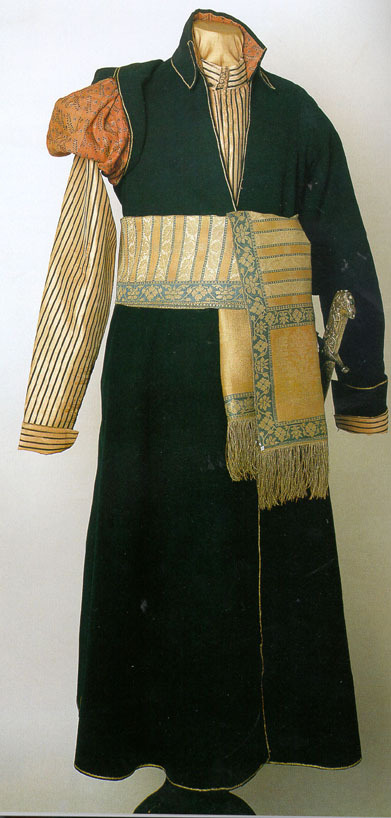Photo


Abbotsford House, Scottish Borders, Scotland, United Kingdom ~ gisforgeorgina
2K notes
·
View notes
Photo







“Kontusz (from Polish language; plural kontusze; also spelled in English language as Kontush or Kuntush from Ukrainian: Кунтуш) (originally Hungarian Köntösis - robe) - a type of outer garment worn by the Hungarian, Polish, Belarusian, Lithuanian and Ukrainian male nobility (szlachta). It became popular in the 16th century and came to the lands that were under Polish-Lithuanian Commonwealth rule via Hungary from Turkey. In the 17th century, worn over an inner garment (żupan), the kontusz became a notable element of male Polish national and Ukrainian cossack attire.
The kontusz was a long robe, usually reaching to below the knees, with a set of decorative buttons down the front. The sleeves were long and loose, on hot days worn untied, thrown on the back. In winter a fur lining could be attached to the kontusz, or a delia worn over it. The kontusz was usually of a vivid colour, and the lining was of a contrasting hue. The kontusz was tied with a long, wide sash called a pas kontuszowy. The kontusz was more of a decorative garment than a useful one. Tradition states that the first kontusze were worn by szlachta who captured them from Ottomans to display as loot. Throwing kontusz sleeves on one’s back and stroking one’s mustache was considered to be a signal of readiness for a fight.
In 1776, Sejm deputies from different voivodeships of Poland were obliged to wear different coloured żupany and kontusze denoting their voivodeships. In Poland, kontusz was worn mainly by the nobility, but it was a common part of Zaporozhian cossack attire.” (source)
Images: [x][x][x][x][x][x][x]
3K notes
·
View notes
Text

















Eurasian Red Squirrel/ekorre. Värmland, Sweden (August 26, 2021).
762 notes
·
View notes
Text
growing up by the coast means that instead of crows on your roof you get seagulls and it honestly feels much more threatening
56K notes
·
View notes
Photo





These stunning mosaics decorate Santa Maria Maggiore in Rome which, according to legend, was built following Pope Liberius’s dream of the Virgin Mary followed by a miraculous summer snow fall the next day indicating where the Virgin wished to have her church. As a result the site is often called “Our Lady of the Snows.” In the 13th century Pope Nicholas IV wanted to redesign the original 5th century mosaic and commissioned Jacopo Torriti in 1291. Upholding the founders dedication to Mary the scenes tell the story of her life with the Coronation as the most prominent scene. It was the first time in Italy that the Coronation was displayed in such a monumental manner. The basilica is also the burial site for the renowned baroque artist Bernini. Both sites are open to visitors.
5K notes
·
View notes
Text
Greek Mythology: Unfortunately, Zeus was horny.
Norse Mythology: Unfortunately, Loki was bored.
Egyptian Mythology: Unfortunately, Set was envious.
Japanese Mythology: Unfortunately, Susanoo was rude.
84K notes
·
View notes
Text
y'all check out this les mis ass mural i saw the other day

like, idk if it's an intentional tongue in cheek reference or if the artist was just like "hmmm okay Liberty Leading the People looks great but it's off-center... what's something narrow i can use to balance it out that's French Enough to fit the theme?"
36 notes
·
View notes
Text



Eurasian Red Squirrel/ekorre. Värmland, Sweden (August 13, 2017).
468 notes
·
View notes














